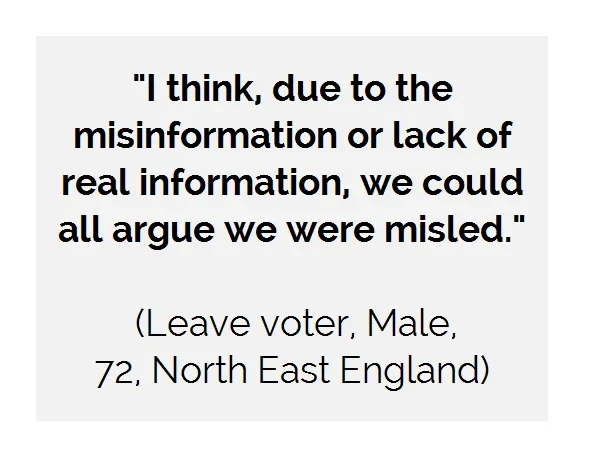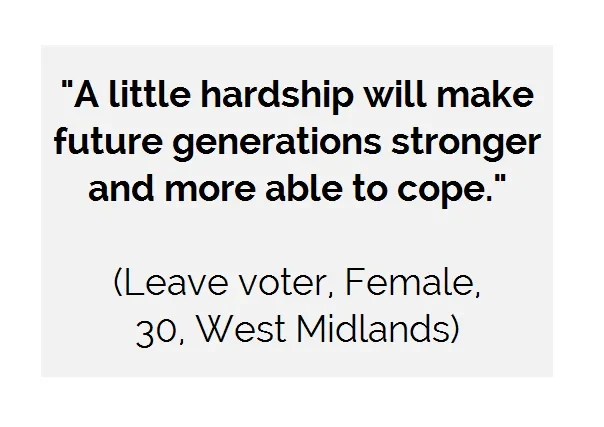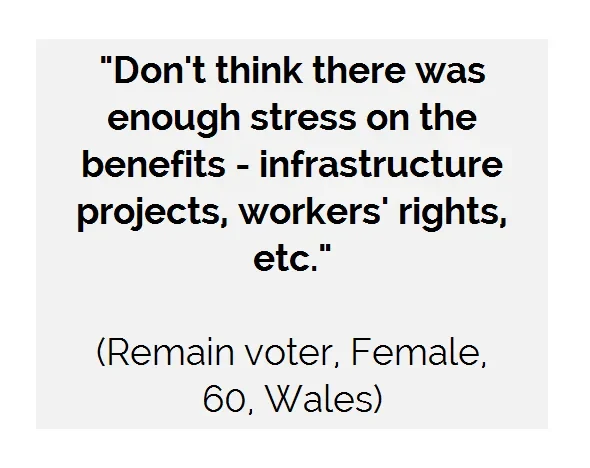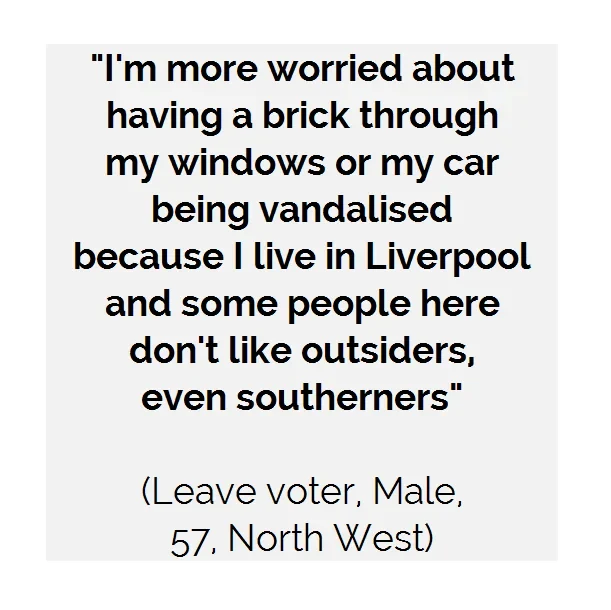YouGov's focus groups suggests Leavers are more certain about the long-term future but Remainers are concerned about national cohesion
We recently conducted two online discussion groups to 'test the water' of public opinion one month after the EU referendum. One group was carried out with Remain voters, and one with Leave voters, from a spread of ages and geographic regions. The main headline findings include:
- Leave voters remain apprehensive about the short term future, however, in the main, they do not regret how they voted
- The issue of sovereignty and control seemed more important as a driver of the Leave vote than immigration
- Remain voters are particularly concerned about our national cohesion – perception that the campaign has opened up political and constitutional fault lines
- Remain voters expressed no great desire for a second referendum, even among those who had signed the petition
Leave voters
Initially, Leave voters were apprehensive and unsure about the economic and political fallout of the Brexit result. There was a belief that the public had been manipulated during the campaign by pro-leave politicians who had played on fears and anxieties with catchy sloganeering. Furthermore, these politicians had not thought through the consequences of their actions, and the immediate aftermath highlighted how little preparation had been undertaken for Brexit.

However, with one exception, they did not regret their decision to vote leave, and the idea of a second referendum was rejected. Most claimed that their decision to vote leave had been based more on regaining sovereignty and control, rather than immigration (though the two issues were related for some). That said, there was also a strong sense that that the result had been reinforced by a protest vote, directed particularly at George Osborne and David Cameron, who were viewed negatively for having assumed they would get the result they wanted. In fact, few politicians seemed to be held in particularly high esteem, with additional concerns about Theresa May’s lack of mandate and Corbyn’s perceived dictatorial approach.

In the month since the result, few had noticed any significant changes to their day to day lives, or their household finances, with the perception that the most tangible change had been to the political landscape. Looking forward, there was a prediction of short term economic and political disruption but a much rosier long term outlook for the UK. The group ended on a much more positive note than it had begun, with participants upbeat about the result and what the future might bring.
Remain voters
Remain voters said that they still have a variety of negative emotions about the result including fear, anger and sadness.
Similarly to the leave group, they were staunchly negative about the campaign, and felt that those campaigning for remain had been complacent, and not found as effective a ‘hook’ as the leave camp, who had successfully exploited wider fears and anxieties. Like the leave group, they also felt that the public had voted based on misinformation and spin, and to protest against the political establishment, but they went further, suggesting that both the campaign and the result had stirred up unpleasant, even “repellent” characteristics around xenophobia and intolerance that were now widespread.

The remain group also felt that the result had opened up divisions between those of different political persuasions to a much greater extent, and they had been scared to speak out about their political beliefs since the result. Perhaps tied to this sentiment, there was no great desire for a second referendum (though some had signed the petition in anger) nor was there any desire to delay triggering Article 50 for any great length of time.
There was cautious positivity for Theresa May, some stemming from the fact that she campaigned for a remain vote, but still a feeling that it is too early to judge her. Unlike the leave group, there was a more balanced view of Jeremy Corbyn, who was seen to have popular appeal amongst a certain demographic.

Looking to the future, there were strong concerns about Britain’s standing in the world as an outward looking country after Brexit, and our cohesion as a nation, with particular concerns voiced about Scotland’s desire to remain in the union. Where economic hardships can be turned around, participants felt that the social and political divisions created by the campaign were much more profound and longer lasting. However, only when pushed, some participants admitted that they may feel more inclined towards Brexit in a couple of years (though none claimed they would vote any differently).
In terms of personal finances and job security, this group collectively felt that they will adopt a much more cautious attitude, with an emphasis on spending rather than saving, though there was also a hope that Brexit will remain in interest rates remaining low.
Further research
We will aim to further examine and explore the effect Brexit has on the public - both as voters and consumers - in the months ahead. Areas we will look at include household finances, financial products and the retail and purchasing landscapes.
Please email Jerry.Latter@yougov.com if you are interested in having input in future discussions.
More information about YouGov's Qualitative research
Image from PA








